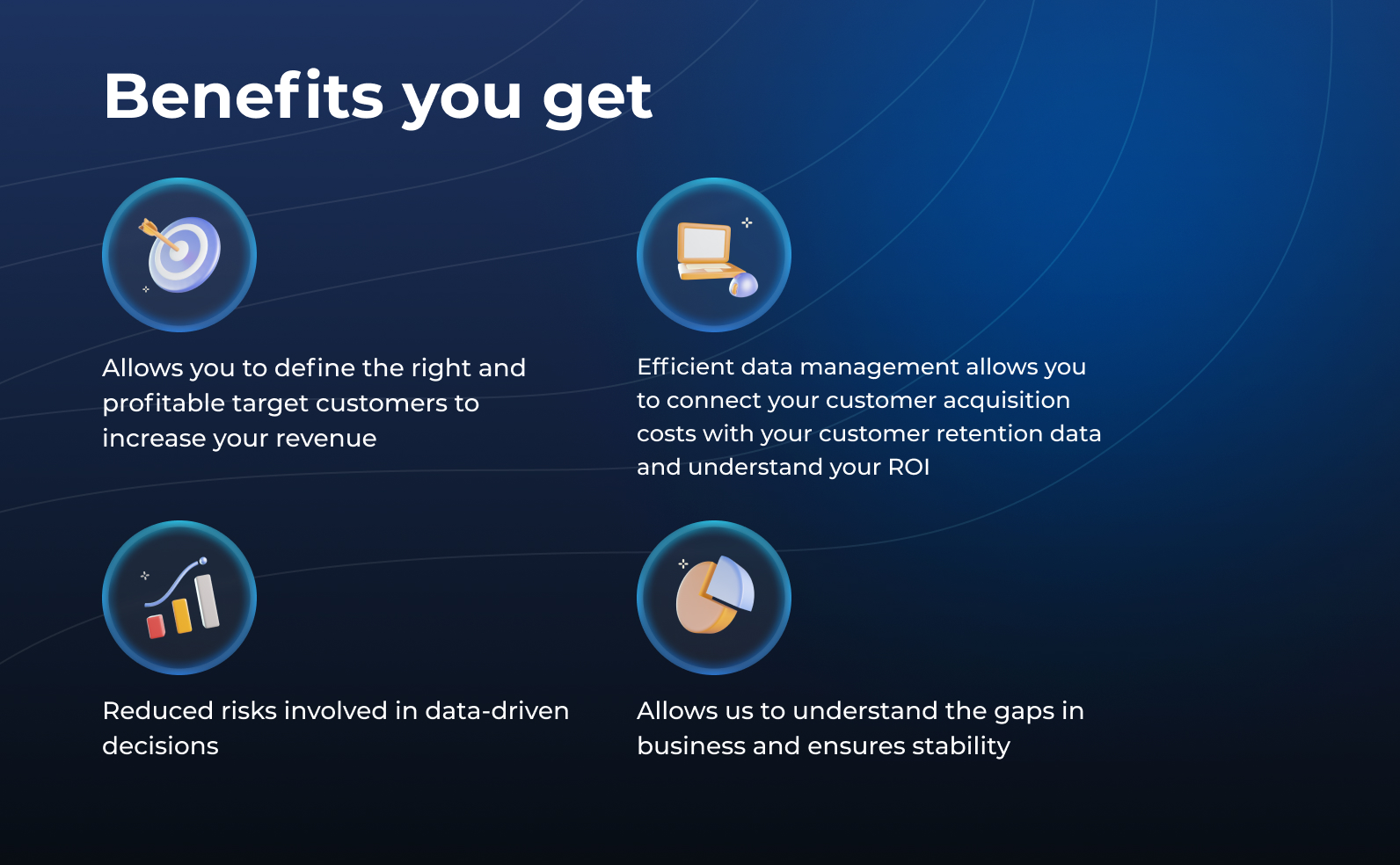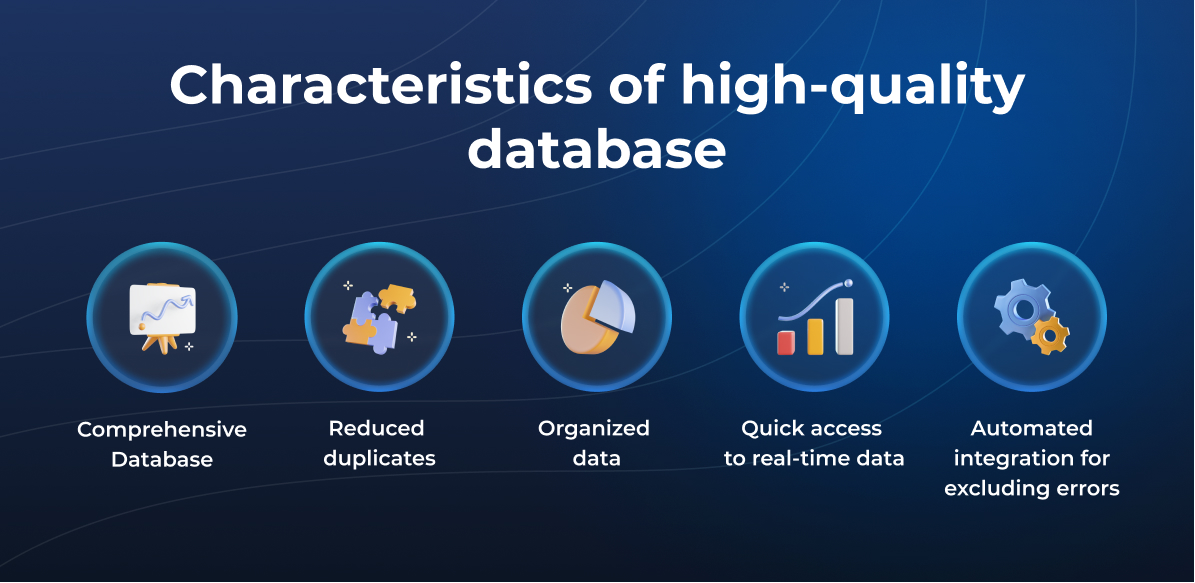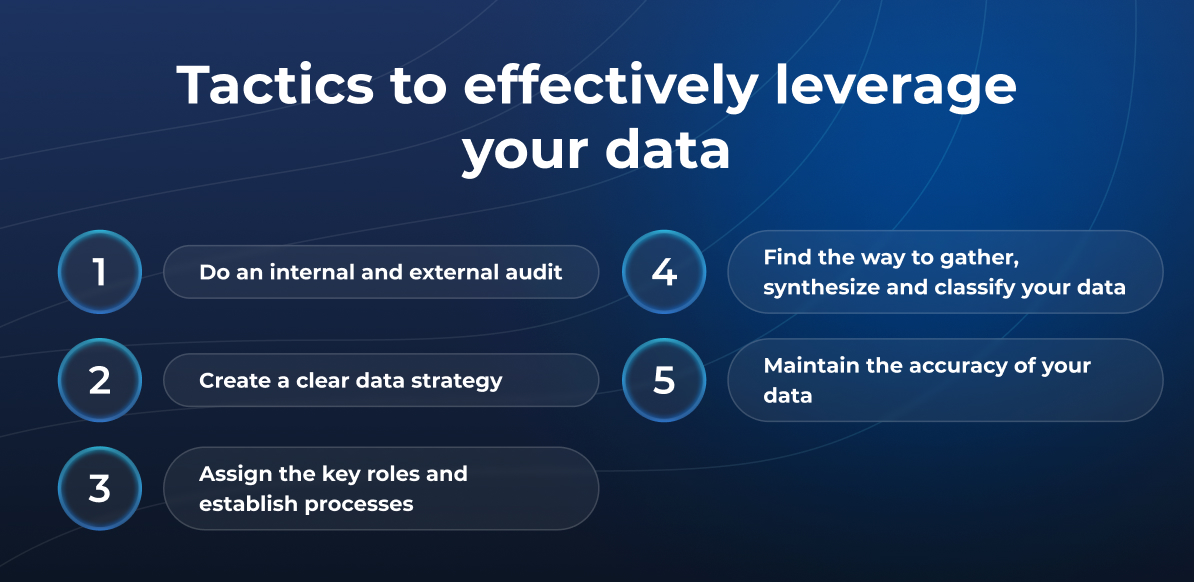Table of Contents
Data is a key to your competitive advantage. To succeed in the current environment you need to take crucial business decisions based on a clear digital strategy build on valuable data insights.
However, even data-structured businesses manage to leverage only a fraction of their assets. To extract valuable insights out of your data and make your business more data-driven, you need to hire a team of experienced data governance specialists, able to implement the right tools to structure and classify your data turning it into an efficient competitive advantage. Data-driven insights allow building the products that will impress and allows you to grow your current business far beyond its size and reach.
The role of raw data in the product lifecycle
Product lifecycle includes planning, discovery stage, product defining, development, and product launch.
During the planning stage, data provides the possibility of opportunity sizing of problems and allows us to understand potential solutions.
During the development phase, data plays a key role in designing experiments for measuring the impacts of product changes. Through ROI analysis, it can provide guidance on the decision making whether to launch or wait with the launch of the product.
During the launch, data plays an important role in measuring the key improvement results from experiment metrics and OKR metrics and enables to leverage of future data insights for the next planning stage and future experiments for measuring long-term product impacts.
Big data collection encompasses metrics data and information from various sources and users allowing you to build a more robust understanding of your current or potential customers. It allows you to understand your customers, their pains, and challenges and find the way to address them.
Benefits of leveraging data
According to the research, data-driven businesses are 1-3% more profitable and up to 5% more productive than competitors.
Let us quickly delve into the major benefits, that leveraging data insights provides for your business.
Smooth product development
Lorem ipsum dolor Product development encompasses many steps before launching a successful product including market research, feedback analysis, marketing strategy development, and adjusting other essential aspects. Data collection can help businesses to identify the product their customers want. Data analysis allows us to measure current client metrics and predict future outcomes. Based on data businesses gauge customer feedback, draft customer journeys, and lead funnels.
Reduced marketing cost
Promoting new brands and expanding your customer reach are essential aspects of any business. Leveraging data analytics allows focusing only on those strategies which have reliable outcomes and desired impact. It allows for launching customer-oriented marketing campaigns increasing overall strategy efficiency and reducing costs for persuading your customers.
Streamlined efficiency of core business processes
With the help of data analysis, one can identify the areas, which need improvement thus cutting down the additional expenses and finding new value opportunities. Analytics also positively influences the customer experience and overall quality of service allowing quicker product value improvement and increasing sales figures.
Awareness of the current market trends
The ability to collect data across one’s industry and area of customers allows gaining a considerable competitive advantage. It also allows tracking the existing and future trends. Leverage data assets allow learning from the failures of competitors in case of choosing an efficient data strategy.
Increased business longevity
The right data and analytics team can gather and process data extracting valuable business actionable insights. It allows to improve the overall quality of products and services, take more data-driven decisions and stay one step ahead of competitors thus increasing business longevity.
Higher security and lower risks
Choosing the right data strategy allows for the identification of vulnerabilities, opens a unified view of security breaches, and is one of the crucial factors in resolving fraud cases. Efficient data management allows settling the instant threat reporting.

Why do companies miss up to 75% of their data?
It is estimated, that daily 2.5 billion GB of unstructured and semi-structured data is generated.
However, even data-structured businesses manage to leverage only a fraction of their assets. The reasons can be different starting with the low data quality, fragmentation, security issues, and finally the nature of data. According to Gartner research, 80% of companies deal with unstructured data, and the other 15% with semi-structured.
The reasons can be different. Primarily, companies are unable to cope with huge amounts of data. The other reason is that the data is generated by various data sources and it is difficult to predict the following format of data you will need to deal with. Handling multi-format sources and databases is too costly and time-consuming.
Catching up with the big data and growing visibility is what all cross-industry organizations strive for. However, data-focused businesses can only leverage a fraction of their assets. The reasons can be different, however, the most widespread reasons are the nature and quality of data gathered – structured, semi-structured or unstructured.
Thus companies need to choose an efficient data strategy and work with the material they gather, structure it, and classify and set it into a hierarchy to manage and protect the raw data effectively.
Why do companies miss big amounts of their existing data?
Volumes
Companies have to handle silos if unstructured data. And it is difficult to handle it. Moreover, they have to handle a variety of multi-format sources, deal with various datasets and need special tools.
Budgdet
The cost of data analysis is one of the main reasons why companies give up a considerable portion of generated data. Automation can cost a lot and demands the integration of various tools and platforms.
Quality
Lorem ipsum dolor sit amet, consectetur adipiscing elit. Ut elit tellus, luctus nec ullamcorper mattis, pulvinar dapibus leo.
How to leverage data collection and grow your business?
Data collection allows you to analyze your customer pain points and clearly define their needs to offer them exactly what they want as well as track the key performance indicators. When you identify the challenges your customers face, based on data, you can offer the best solutions.
It also allows you to find potential customers based on the study of the behavioral patterns of your current target audience.
Leveraging data allows you to create tailored market strategies and increase your conversion rates.
To extract maximum efficiency out of your data, you need to set up the data collection system, assign data owners and an analytics team, take care of security issues and find tools that will tackle data volumes, source fragmentation, cost operations, and quality control.
Understanding the quality of data with the right data strategy
There are main characteristics of the data proving that it is of high quality and can be converted into valuable business insights:
- Comprehensive database. You can get an inclusive view of business operations in case you gather data from a wide variety of resources.
- Reduced duplicates. Reduced repetitive data will allow to cut down the additional repetitive analyses.
- Organized data. Data from various resources should be analyzed using various algorithms. Comprehensively organized data will make it more accessible for the user.
- Quick access to real-time data. It enables faster decision-making based on data-driven insights.
- Automated integration. Allows to consolidate the data and avoid human errors for enhancing the workflow.
When the data is understood and seen as an asset, it allows for the extraction of the maximum value for the entire organization. And this value is driven by the company’s capabilities in integration terms.
The availability of an efficient strategy, the right set of tools, an overall integration framework, and layered architecture to enable an appropriate pace for data consumption, guarantees that data will be leveraged at maximum efficiency.

Tactics to effectively leverage your data
- Conduct an audit of your current data. You need to analyze what datasets you already have and examine whether you urge to your full capacity. Set up time with each of your data vendors and get info about the latest updates on each platform.
- Internal audit. It will help you to share insights with other departments and maximize the existing resources.
- Outline specific goals and align them with your business needs for using your data. It can be for instance learning key targeting, seeking new markets, and initiatives to grow business.
- Ensure you have established specific lines of communication between people dealing with data. Define what you are trying to achieve, it will allow you to gather and synthesize the right data to give a better work product.
- Set data governance framework to ensure the expected quality. Considering data as a business issue allows us to establish an effective governance model and drive more value from the data management process.

The main mistakes in the process of data leveraging
Failing to address the fundamentals
It is important to validate data modes, allying them with the overall architecture, establish the data quality and consistency balance, and take into account the ownership and security/access issues.
Since organization’s data evolves at a time, it is important to take care of the basics of dealing with the data to avoid security breaches and expensive operations and management.
Overwhelming data collection
Overwhelming data collection leads to stalled projects and analysis paralysis. If data produces ambiguous results and does not clearly support your initiatives, you have to filter it out.
No central strategy to collect data
Make sure there are people responsible for data hygiene. It will prevent you from data inaccuracy and poor data quality.
Your data sits in a silo
Many companies simply collect big amounts of data and do not extract value from it, letting it sit in a silo.
Lack of dedicated Business Intelligence team
Gathering data is good, however, extracting value out of it is a complicated task. Having a professional data management team, who will be responsible for the management of data acquisition and utilization will guarantee value for your business.
Lack of data architecture plan
When working with big data you need to have a data governance framework in place and make sure you are leveraging data properly. What is more, you need to take care of a well-established data architecture plan for data storage.
How will Altamira help?
Altamira helps companies to successfully leverage data at all stages and exclude the maximum value out of your data. Our experts will assist in choosing the right architecture, data leverage strategy, implementation, and operational management of tools helping companies to harness their data and streamline the data management process.
We help businesses to raise their intelligence, expose data for consumption, and build the overall view of business relations by providing strategies and the right tools allowing them to perform data analytics, derive actionable results, and achieve the outcomes you expect.
Our experts assist in understanding and analyzing the current database structure to successfully leverage your data and generate big data business value to personalize and scale your customer care.
Conclusion
Only a very few companies manage to succeed in their striving to become more data-driven. Success is guaranteed for those, who will find their way into it. Finding the right strategy to collect, refine, segment, store, monitor and display excessive data with consistency and efficiency is one of the biggest challenges in the process of leveraging your data.
Leveraging data offer an effortless way to predict client needs, present relevant products provide relevant products, measure business performance, and increase quality across various business aspects.
However, it is essential to leverage the right data and apply it while taking crucial business strategic decisions. It is highly recommendable to involve expert data analytics teams to help you capture relevant data, choose the right data strategy, extract insights and turn it into a considerable competitive advantage.




